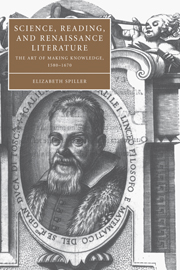Book contents
- Frontmatter
- Contents
- List of figures
- Acknowledgments
- Introduction: making early modern science and literature
- 1 Model worlds: Philip Sidney, William Gilbert, and the experiment of worldmaking
- 2 From embryology to parthenogenesis: the birth of the writer in Edmund Spenser and William Harvey
- 3 Reading through Galileo's telescope: Johannes Kepler's dream for reading knowledge
- 4 Books written of the wonders of these glasses: Thomas Hobbes, Robert Hooke, and Margaret Cavendish's theory of reading
- Afterword: fiction and the Sokal hoax
- Notes
- Index
- Cambridge Studies in Renaissance Literature and Culture
Afterword: fiction and the Sokal hoax
Published online by Cambridge University Press: 22 September 2009
- Frontmatter
- Contents
- List of figures
- Acknowledgments
- Introduction: making early modern science and literature
- 1 Model worlds: Philip Sidney, William Gilbert, and the experiment of worldmaking
- 2 From embryology to parthenogenesis: the birth of the writer in Edmund Spenser and William Harvey
- 3 Reading through Galileo's telescope: Johannes Kepler's dream for reading knowledge
- 4 Books written of the wonders of these glasses: Thomas Hobbes, Robert Hooke, and Margaret Cavendish's theory of reading
- Afterword: fiction and the Sokal hoax
- Notes
- Index
- Cambridge Studies in Renaissance Literature and Culture
Summary
In May of 1996, New York University physicist Alan Sokal published what has become a well-known essay on postmodern physics in a special “Science Wars” issue of the journal Social Text. Entitled “Transgressing the Boundaries: Toward a Transformative Hermeneutics of Quantum Gravity,” Sokal's article promised to offer a practicing physicist's support for the premise that
physical “reality,” no less than social “reality,” is at bottom a social and linguistic construct; that scientific “knowledge,” far from being objective, reflects and encodes the dominant ideologies and power relations of the culture that produced it; that the truth claims of science are inherently theory-laden and self-referential; and consequently, that the discourse of the scientific community, for all its undeniable value, cannot assert a privileged epistemological status with respect to counterhegemonic narratives emanating from dissident or marginalized communities.
Sokal undertook this project by offering to describe how recent developments in studies of “quantum gravity” both “synthesized and superseded” Heisenberg's quantum mechanics and Einstein's general theory of relativity. After suggesting that this new work emphasized how phenomena such as gravitational fields were non-linear, fluid, and interconnected, Sokal issued a call for a “liberatory science” that would recognize and be responsive to the social and political implications of these scientific arguments. If the theory of gravitational fields were understood to be non-linear, so could the study of science: in the process, the “dominion” of science would be radically changed in favor of more politically desirable (more inclusive, less hierarchical, less sexist, less colonial, etc.) ends.
- Type
- Chapter
- Information
- Science, Reading, and Renaissance LiteratureThe Art of Making Knowledge, 1580–1670, pp. 178 - 183Publisher: Cambridge University PressPrint publication year: 2004

